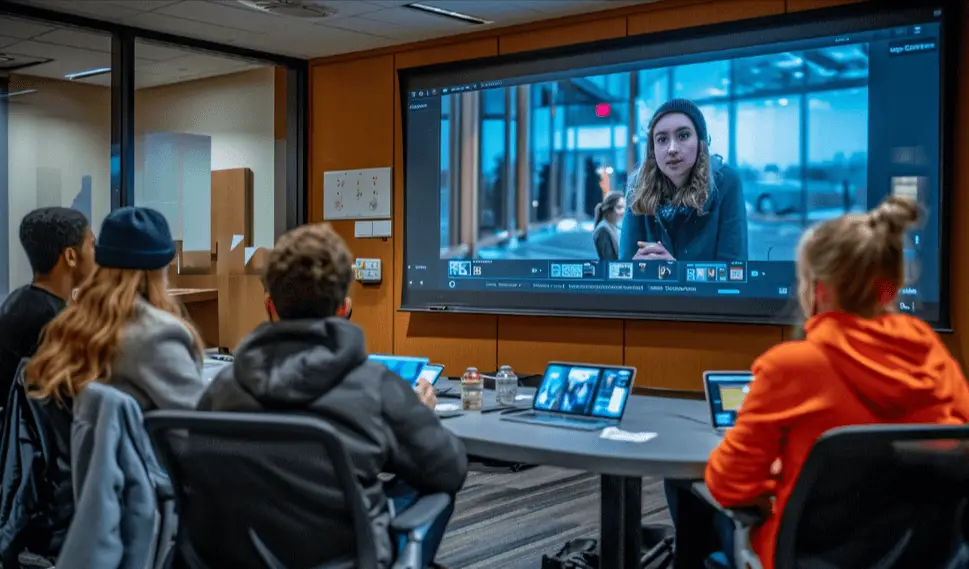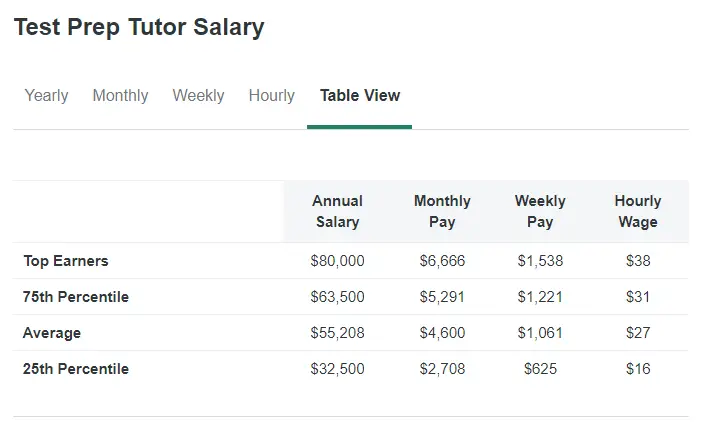Teachers possess a wealth of skills, knowledge, and experience that can be applied to a variety of career opportunities. As former educators seek new professional challenges or desire a change of pace, there are numerous paths available to leverage their expertise. This article explores exciting remote career options for former teachers, highlighting the job description, required expertise, transferable skills, training, salary expectations, job market outlook, work environment, work-life balance, and networking opportunities for each role.
In addition to that, I enlisted the help of a newly retired teacher: Lisa Nanny. Lisa has been in education for two decades in Texas, spanning roles in K-12 grades, as well as a sign language interpreter.
For a snapshot, take a look at the table below. Please note, this is generalized, and details can be heavily dependent on factors like location, experience, and the industry that the job exists in.
| Job Title | Salary Range | Work-Life Balance | Experience Needed |
| Online Tutor | $30,000 – $50,000 | Excellent | Little |
| E-learning Course Developer | $50,000 – $80,000 | Good | Moderate |
| Virtual Museum Curator | $40,000 to $70,000 | Excellent | Moderate |
| Adult Education Instructor | $40,000 – $60,000 | Excellent | Moderate |
| Test-prep Instructor | $35,000 – $55,000 | Good | Moderate |
| Translator or Interpreter | $40,000 – $70,000 | Good | Highly Specialized |
| Grant Writer for Edu. Org | $45,000 – $70,000 | Good | Highly Specialized |
| Education Program Evaluator | $55,000 – $85,000 | Good | Highly Specialized |
| Gov/Nonprofit Education Liaison | $45,000 – $75,000 | Fair | Moderate |
Online Tutor

As a remote role with a growing demand, online tutoring can be a good fit for those with a solid background in a particular subject area, and even better for those with previous teaching experience. Leveraging digital platforms and tools, online tutors offer focused guidance to students either individually or in small groups, helping them to comprehend specific subjects, prepare for exams, or develop new skills.
This role truly shines as a perfect use-case for transferable skills of former teachers. Think about your well-honed abilities in instruction, lesson planning, and student assessment – all these skills can be seamlessly transitioned into the online tutoring environment.
If you’re considering this path, it’s worth noting that some online tutoring platforms may ask for specific certifications or credentials. However, the formal training requirement is generally minimal. Salary-wise, it’s common for online tutors to earn an hourly rate that can range from $15 to $75 per hour. Factors such as the subject, level of expertise, and the platform you choose can influence this rate. So, while a geometry tutor might earn less, if you’re teaching something like advanced Hungarian, your earnings can be much higher.
The same is true with geography. Tutors based in NY earn an average of $32 per hour, while Texas-based tutors make only $17.55 per hour. Keep in mind though, this is based on physical information from the Bureau of Labor Statistics. Online tutors could make substantially more profit by working from a lower cost-of-living location.
In terms of work-life balance, online tutoring stands out with its inherent flexibility. As an online tutor, you work remotely, most often from the comfort of your own home, and are able to set your schedule based on the needs of your clients and your own availability. This flexibility extends to your workload as well, allowing you to achieve a positive work-life balance.
Traditional educational settings shortchange real-time student contact and instruction. Online schools most often have smaller group settings which again will allow for more time to be spent on personal student engagement. I would have to agree there is a learning curve not often recognized when it comes to required knowledge of the various Learning Management Systems. This climate is very much improved post-covid when teachers had to learn in a “sink or swim” situation, with much dependent on their own personal determination and resolve. The need for constant personal growth must be acknowledged.

Retired Educator
E-learning Course Developer
In the realm of remote jobs, being a course developer emerges as a highly promising opportunity for ex-teachers. This role revolves around weaving together interactive and multimedia elements with assessments to generate engaging online courses.
Possessing a foundation in education, a strong grasp of content, and familiarity with instructional design principles form the core prerequisites for this role. Additionally, the ability to deftly navigate e-learning authoring tools and learning management systems is a must.
However, your existing teaching skills are not to be overlooked here. As a former educator, you can lean heavily on your experience in curriculum development, assessment design, and understanding diverse learning styles. These are invaluable assets in this role.
It’s important to mention that stepping into the world of e-learning course development might call for further training or certification. Specifics would depend on the area of focus and may involve instructional design, e-learning tools, and relevant technologies.
When considering income, e-learning course developers can expect to earn an average salary falling somewhere between $50,000 and $80,000 annually. This, however, will largely depend on your experience, location, and the subject matter/industry that you’re in.
The e-learning industry is in the throes of a major growth spurt. With the rising demand for online courses across various sectors – including education, corporate training, and professional development – the future looks bright for e-learning course developers.
Whether you’re collaborating with instructional designers and subject matter experts from a cozy home office or an energetic office environment, the role offers an appreciable measure of flexibility. Regular work hours are the norm, though remote work or project-based deadlines may allow for added adaptability.
Finally, a world of networking and learning opportunities awaits you in the e-learning community. By participating in e-learning associations, attending conferences, and engaging in online communities, you’ll gain the chance to network, learn, and grow in this increasingly relevant field.
Virtual Museum Curator

I don’t know about you, but working for a museum would be super cool! You would get to blend educational expertise with a passion for history, art, or science. In this role, the curator is responsible for developing online exhibits, creating engaging and informative virtual tours, and possibly collaborating with educators to design educational programs that align with school curricula.
Retired teachers, with their deep understanding of how people learn, are exceptionally well-suited for this job. They can effectively translate complex topics into accessible ones, ensuring that virtual visitors of all ages and backgrounds have a meaningful and educational experience. Having said that, it’s important to note that this role likely wouldn’t take a lead in the actual technology and physical aspects of setting up new exhibits.
The salary for a virtual museum curator can vary widely depending on the size and funding of the museum, but it generally ranges from moderate to high, reflecting the level of expertise required. Generally speaking, if the city is larger (think NYC, London, Tokyo) the salary can be expected to be on par with that as well.
An added, often unforeseen benefit of this role is the opportunity for continuous learning and personal growth. Curators are constantly exposed to new information and perspectives as they research and develop exhibits, leading to a fulfilling and intellectually stimulating post-retirement career.
Adult Education Instructor (online)
Venturing into the domain of online adult education, you’ll play the part of a navigator guiding adult learners through various subjects or skills in the vast virtual classroom. This could encompass anything from language courses to professional development to personal enrichment classes.
As an erstwhile teacher, you’re an ideal fit for this remote role. Apart from a solid grounding in teaching and a thorough knowledge of your chosen subject area, your ability to communicate effectively will be crucial. A knack for navigating online teaching platforms and digital tools will also serve you well.
In terms of professional development, formal training might not always be a prerequisite. But bear in mind, some institutions or organizations could ask for specific certifications or credentials, especially contingent on the subject you’re teaching.
Connecting with professional associations, attending virtual conferences, and engaging with online communities can offer a world of networking and professional development opportunities, boosting your profile as an online adult education instructor.
The pay scale for online adult education instructors is quite varied. This depends on factors such as the subject, your level of expertise, and your employer. Payments could be processed either hourly or per course, with rates oscillating between $20 and $75 per hour.
The work environment for this role is as comfortable as your own home, with the added need for some flexibility to cater to different time zones or learner availability.
As the interest in lifelong learning grows, alongside the convenience of remote education, the demand for online adult education is set to surge.
With the flexibility to control your workload and working hours, teaching online adult education courses can strike a healthy work-life balance. So, in essence, you’ll be crafting your own work rhythm.
Test-prep Instructor

Diving into the role of an online test-prep instructor is like opening a new chapter in the same career book. Except this time, you get to use the virtual classroom as your stage, enlightening students on strategies and subject-specific knowledge to ace standardized tests like the SAT, ACT, GRE, or professional certification exams (although, some standardized tests aren’t as widely used currently).
Naturally, this role demands a sturdy foundation in the subject area and teaching experience. It’s like a puzzle—having excellent communication skills and familiarity with the specific standardized test and online teaching platforms are the pieces that complete it.
As a former teacher, your existing skills are your secret weapon. You can employ your instructional abilities, lesson planning, and assessment skills to conquer this new battlefield. Just bear in mind, some test-prep companies might want you to undergo specific training or hold additional certifications.
The compensation can be a mixed bag, ranging from $25 to $100 per hour, based on the test, your level of expertise, the company you work with (or if you’re solo).

You’ll be working remotely in this role, so you might need to plan your schedule to accommodate student availability and different time zones. The plus side? You get to manage your workload and working hours, striking a work-life balance that suits you.
Lastly, it’s a good idea to keep your professional growth on track. Engage with other test-prep professionals, and participate in online forums and professional associations.
Translator or Interpreter

As a remote translator or interpreter, you are the bridge that connects different cultures, converting spoken or written content from one language to another in real time. Whether it’s through the written word for translators or spoken language for interpreters, your task is as delicate as a ballet dance, balancing precision, understanding, and fluency.
Of course, this dance requires you to be fluent in at least two languages and possess strong written skills. While in the spotlight, experience in specialized areas like legal, medical, or technical translation might be your spotlight. Former teachers, despite working remotely, can twirl in with their language proficiency, cultural understanding, and communication skills. Some roles might require a degree in translation or interpretation, and professional certifications, like those from the American Translators Association (ATA), can act like a shining badge of credibility.
Your earnings as a translator or interpreter can be as varied as the colors of a rainbow, with factors such as language pair, subject area, and level of expertise influencing the palette. Typically, hourly rates dance between $20 to $75 or even higher. Keep in mind, though, that interpreters often earn more in settings like translating for a witness in court.
The job market for remote translators and interpreters is like a growing tree, expanding with global communication and businesses seeking linguistic bridges. You’ll be connecting with clients through email, video conferences, or phone calls.
While translators can often orchestrate their own schedules and workload, interpreters might find their hours more structured, depending on their assignments’ nature. Yet, both roles offer a chance to balance the scales of work and life.
Grant Writer for Educational Organizations or Nonprofits (remote positions)
Ah, the world of the grant writer, where the currency is persuasive writing and research, and the destination is funding for educational or nonprofit organizations. The job is pretty straightforward – gather information, stitch together budgets, and prepare supporting documentation. It’s a little like baking a cake, except the cake is a grant proposal, and the frosting is, well, funding.
Now, if you’re a former teacher, this is where you can flex those skills in subject matter expertise, persuasive writing, and synthesizing complex information. You’ve been preparing for this job all those years you were marking assignments, and you didn’t even know it.
Formal training isn’t necessarily required, but courses or certifications in grant writing or nonprofit management wouldn’t hurt. At the end of the day, your employer is focused on whether or not you can put together a persuasive argument in an organized and coherent way. There are many different types of backgrounds that would look favorable for that, not just teaching.
The salary for remote grant writers is up in the air. It’s a little like a treasure hunt, but typically will fall between $45,000 and $70,000 annually. Like most other jobs, it can largely depend on how much money you can bring into your employer, and how much grant money is on the table in the first place. Some industries have much more opportunities than others.
This job can involve periods of intense work, especially when deadlines approach. But on the bright side, you get to control your workload and working hours, so you can still catch that rerun of Friends you’ve been planning to watch.
A well-trained teacher must recognize how to best motivate individual students into action. It stands to reason therefore, a skillful educator is a prime candidate for grant writing. Because the writer must first be intuitive as to what will move her audience to contribute to the need, I would think a former teacher to be a solid employee in this position.

Retired Educator
Education Program Evaluator
In this role, your job will be to assess educational programs, initiatives, or curricula, sifting through a sea of data to prepare reports and deliver recommendations for improvement. This is essentially the detective of the education world, using analytical prowess, research, and communication ability to dig into the best educational practices and evaluation methodologies.
The salary is respectable, and like most of the jobs on this list, depends on various factors like the organization, location, and level of experience. On average, you’ll usually find that these annual salaries sit comfortably between $55,000 and $85,000. Organizations are increasingly recognizing the importance of assessing the effectiveness and impact of their programs and initiatives, so it’s likely that this may even increase in coming years.
Participating in professional associations, attending webinars or virtual conferences, and engaging in online communities is an important part of this role as well. Not only because of the professional growth that comes from that, but you’ll need to stay up to date on new technologies and changes in the industry as well.
Government or Nonprofit Education Liaison (Remote)

As a remote education liaison, you’ll be the essential link between various educational bodies, government entities, and nonprofits, operating from the comfort of your home. Your role is multifaceted, involving enhanced communication and collaboration while coordinating strategic initiatives. You’ll have the opportunity to create and implement innovative programs, distribute key resources, and advocate for influential policy changes in education.
Strong communication, interpersonal skills, and an organized mindset form the core qualifications for this role, supplemented by a robust understanding of the educational landscape and relevant policies. If you’re a former teacher, you’ll find your knowledge of educational practices and your ability to build relationships and solve problems particularly useful.
While specific training isn’t necessary, degrees in fields like education or public policy are advantageous, as are additional qualifications in project management, communications, or advocacy. Salary varies depending on factors like the organization, location, and your experience, typically falling between $45,000 and $75,000 annually. Glassdoor, for example, has this position at almost $59,000 as of summer 2023.
The demand for this role is set to grow, reflecting the increasing emphasis on synergy and coordination within the educational sector. The remote nature of this position allows for a healthy work-life balance, as you’ll have control over your workload and working hours.
What Do You Think?
There are a wealth of opportunities available to former teachers who seek remote work that aligns with their skills, experience, and passions. From instructional design and grant writing to educational policy analysis and content creation, these roles allow educators to continue making a meaningful impact on the lives of learners and the broader education landscape.
As remote work becomes increasingly prevalent, it’s important for former teachers to explore these possibilities and leverage their transferable skills to secure fulfilling, flexible positions that align with their financial needs and career goals.

